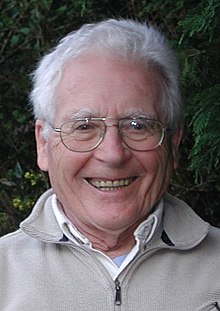James Lovelock
James Ephraim Lovelock (1919 nî 7 goe̍h 26 —) sī chok-ka, gián-kiù-chiá (researcher), khoân-pó-ka (environmentalist), bī-lâi-ha̍k-ka (futurologist), mā sī to̍k-li̍p chò gián-kiù ê kho-ha̍k-ka; toà tiàm Eng-tē ê Cornwall. 1969 nî Lovelock thê-chhut Gaia Lí-lūn (Gaia hypothesis), chú-tiuⁿ Tē-kiû bē-su sī chhiau-seng-bu̍t (superorganism) leh ūn-chok.
James Lovelock | |
|---|---|
 Lovelock in 2005 | |
| Chhut-sì |
James Ephraim Lovelock 1919 nî 07 goe̍h 26 ji̍t Letchworth, Hertfordshire, England |
| Koè-sin |
2022 nî 07 goe̍h 26 ji̍t (103 hòe) Abbotsbury, Dorset, England |
| Bú-hāu | |
| Tù-miâ | |
| Kiáⁿ-jî | 4 |
| Ti̍t-chióng |
See list
|
| Kho-ha̍k sing-gâi | |
| Gén-kiù líng-i̍k | |
| Jīm-tsit ki-kòo | |
| Thesis | The properties and use of aliphatic and hydroxy carboxylic acids in aerial disinfection (1947) |
| Bāng-chām |
jameslovelock |

Tsù-kái
siu-kái- ↑ "SUM – Centre for Development and the Environment :: Arne Naess Chair :: About". University of Oslo. goân-loē-iông tī 14 June 2011 hőng khó͘-pih. 24 January 2010 khòaⁿ--ê.
- ↑ "James Lovelock's detailed biography in English". ecolo.org. goân-loē-iông tī 26 March 2012 hőng khó͘-pih. 30 July 2022 khòaⁿ--ê.
| Pún bûn-chiuⁿ sī chi̍t phiⁿ phí-á-kiáⁿ. Lí thang tàu khok-chhiong lâi pang-chō͘ Wikipedia. |